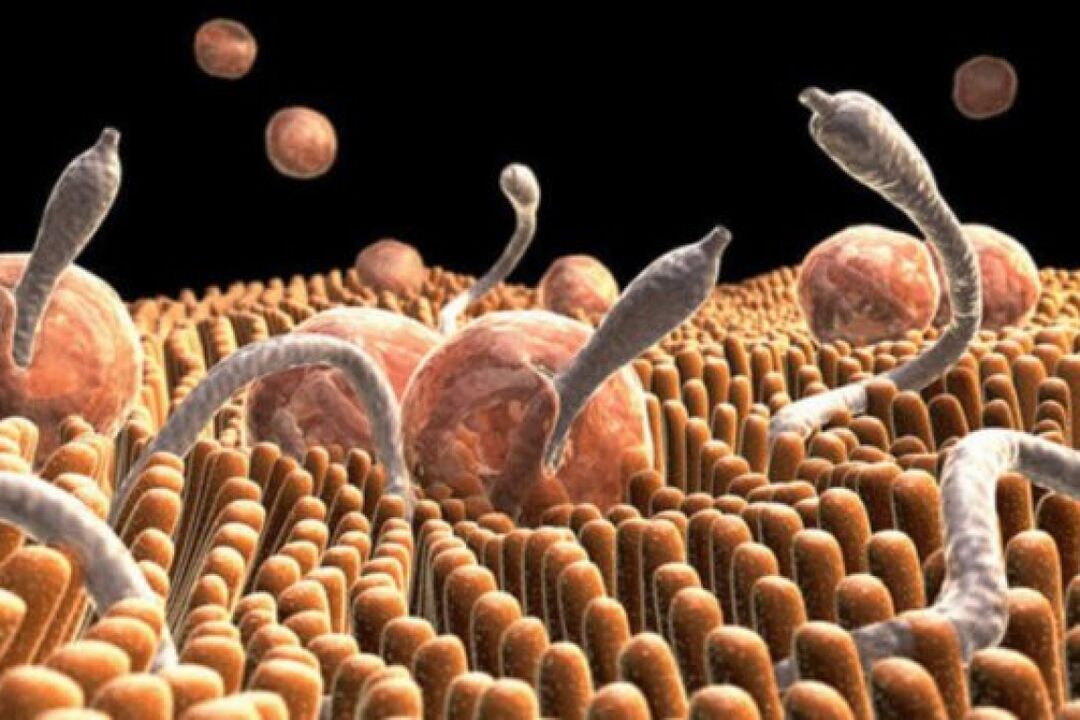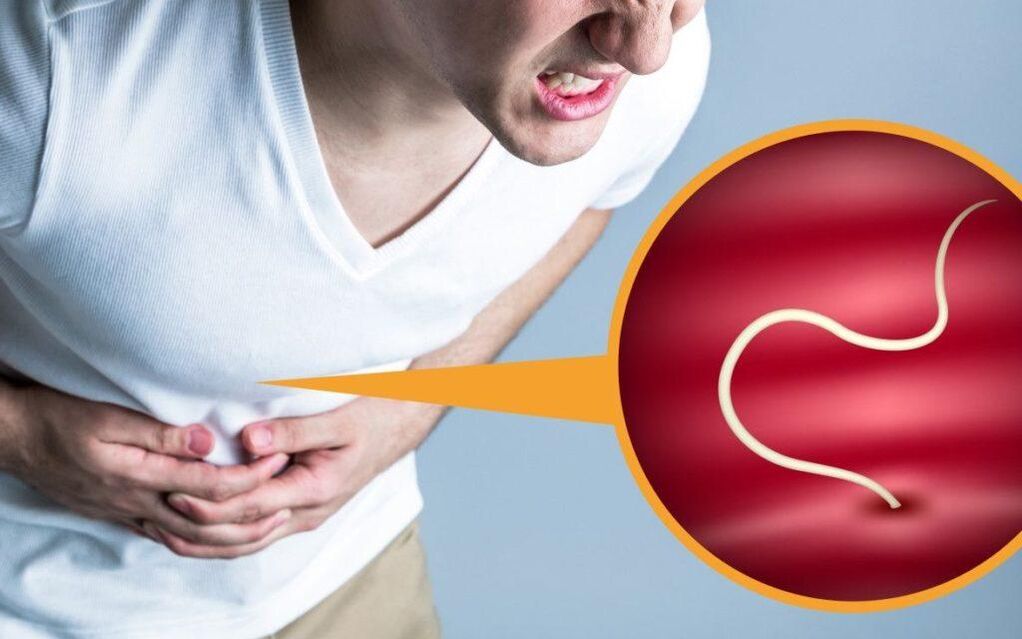
Parasites in the human body arise from the environment and conduct vigorous activity there. Toxic substances formed by the activities of these organisms are toxic to the human body, causing serious health effects. Symptoms of the entry of parasites into the human body can be various unpleasant signs that require urgent treatment. If invasive treatment is started in time, the consequences of the disease will be minimized.
What are parasites in the human body?
Parasites in the human body are invasions that ensure their survival at the expense of the host. Parasites live in the human body, carry out their vital activities, feed on human food and energy, and often on human cells and tissues. Recent studies indicate that the probability of the presence of parasites in any organism is 85%. Some scientists add another 10% to this number.

Dr. Ross Andersen has made a statement that parasitic infections are the most difficult diseases to diagnose in the world. He admits that this is a very bold statement, but it is based on the analysis of data from the medical histories of more than 20, 000 patients and over 20 years of working experience.
It is possible to determine that the parasite is indeed present in the human body by taking a stool sample for analysis. This is the most common and traditional diagnostic method. However, it is extremely poorly informed and unreliable, because the parasite can only be detected if the laboratory assistant sees its larvae through a microscope.
Parasites in the human body can live almost anywhere. There are no barriers for them. They parasitize not only the intestines, but also the liver, joints and muscles, blood, brain, eyes. Science has known more than 100 types of parasites that live in the human body, from invisible amoebas to worms several meters long.
But after all, worms do not always lay many eggs, which means that during standard studies, parasites may not be detected. Some experts recommend performing the test three times, but this does not guarantee a reliable result. It is believed that to detect parasites, at least 8, or even 10 stool studies need to be performed.
At the same time, it was discovered that the most common parasites living in the human intestine are precisely helminths. They all have different shapes, they can be like a wooden leaf, like a woman's bracelet, like a pencil sharpened on both sides.

However, they have one thing in common - they pursue the goal of destroying their master, squeezing the maximum benefit from his body. In addition, all parasites are highly reproductive and survivable.
It is a mistake to believe that pinworm infestation is a disease reserved for young children. Very often adults get them, and most people do not even suspect such an unpleasant and dangerous neighborhood.
Types of parasites in the human body
Parasites in the human body. When infected with any kind of parasitic microorganism, a person may not even be aware of this trouble. Only a few symptoms can signal the presence of pathogenic organisms: general malaise, increase or decrease in body weight.
Signs of invasion of the organism appear only in those cases when the number of bacteria reaches a large value and the general and local immunity is significantly reduced. Many types of worms have the characteristic of causing great harm to human health.
Types of parasites in the human body:
- roundworm:super small in size. The most famous representatives of this group are Trichinella, roundworm, pinworm, flagellate;
- fluke:group of flatworms. They are parasitic inside and outside the body. These include flukes, liver flukes;
- code:tapeworm, tapeworm, echinococci, is a type of tapeworm. They have no digestive system;
- thorny head: are worms, small in size, long flattened body, covered with spines;
- with shaver:a person becomes infected from infected fish, birds, or mammals. Microorganisms that live under the skin. These include the round worm of risk. It is also known as the Guinean worm. The risk of cavitation is very high;
- amoeba: single-celled microscopic helminths. It has an irregular shape, which changes constantly. Deposited in blood vessels, it causes pathologies of the heart and vascular system, the development of stroke. As the causative agent of amoeba;
The liver is affected by lamblia, amoeba, schistosomes, roundworms, echinococci, leading to disorders of many processes in the body. The liver and other organs are defenseless against an army of harmful microorganisms.
How parasites enter the human body
Parasites in the human body. Parasitic and helminthic diseases are caused by pathogens that enter the human body in a number of ways. Usually, infection occurs when a helminth (parasite) enters the mouth (contamination of food and water with soil, eggs, and germ cysts), through dirty hands.
Insects (flies, cockroaches), rodents and larger animals (cats, dogs) can transmit parasitic infections and protozoa diseases through infected household items.
Parasitic pathogens and their larvae can live in most organs and tissues - in the intestinal lumen of both large and small, rectum, biliary and urinary tract, in the bronchopulmonary system, blood, brain and liver tissue, in muscle tissue and in the eye. . .
In children's groups, helminth eggs are transmitted through toys and dirty hands. Some parasites can enter the host's body by contact through the skin (even intact) and mucous membranes, less often through inhalation.
Over the course of evolution, to preserve their species, many parasites have developed special mechanisms for their spread (for example, a complex developmental cycle with host variability, formation of cysts and protective membranes).
The parasites have lost some organs (vision, digestive system). But at the same time, the reproductive system of the parasite has reached amazing development (hermaphroditic, a large number of eggs secreted by one individual).
Diagnosis of parasitic diseases
Parasites in the human body. An important issue is the diagnosis and detection of parasites in order to promptly treat and remove them from the body. Diagnosis and identification of many types of helminths is based on the detection of parasites, their eggs in the stool, and the use of other techniques.

Often, multiple stool examinations are required to confirm the definitive diagnosis of parasitic disease. With intestinal worms, a study is performed on the eggs of the parasite by scraping from the perianal folds.
ELISA (enzyme-linked immunosorbent test) allows you to identify pathogens by testing for antibodies in the blood. A common analysis for all parasitic and helminthic invasions showed a percentage increase in blood eosinophils, which indicates an allergy, which is often a sign of iron- or iron-deficiency anemia. other origins (macrocytic, B12 deficiency).
Prolonged large infestations of parasites can lead to electrolyte changes and mineral deficiencies (calcium, phosphorus). Biochemical tests for signs of liver damage, transaminases, and bilirubin are often used when helminthic infection is suspected.
Ultrasound, endoscopy of the stomach and duodenum, CT scan - check - can be used in the diagnosis of some parasitic diseases (echinococcosis, giardiasis). With helminthiasis, a biopsy of muscle tissue and skin is mandatory (detection of parasites and confirmation of diagnosis).
Symptoms of the presence of parasites in the human body
Parasites in the human body are organisms that live outside of the host. They live a parallel life inside our bodies, taking our energy, our cells, and our food. It's also no secret that they discharge their waste products directly into our bodies and die there.
Symptoms of parasites in the human body are quite diverse. Their insidiousness is that they all manifest themselves in ways that are almost impossible to diagnose. Regardless of whether a person is infected with worms, the symptoms of any helminth disease will be very similar.
In addition, the appearance of symptoms is characteristic of a lack of any kind of nutrient, because it is known that parasites draw the most useful nutrients from food, including vitamins and minerals. matter.
Symptoms of parasites in the human body:
- constant fatigue, decreased performance, nervousness, irritability;
- drowsiness or, conversely, insomnia;
- problem skin and hair;
- cosmetic defects in the form of peeling nails, cracked heels, various spots on the skin, premature wrinkles on the face;
- abdominal pain, bloating (flatulence and bloating);
- stool disorders (more often in the form of diarrhea, but also with constipation);
- significant change in weight in a relatively short time;
- bulimia (persistent increase in appetite), or conversely, loss of appetite;
- hypovitaminosis (vitamin deficiency);
- anemia, low hemoglobin; granulomas, tumors;
- headache, joint pain, muscle pain;
- grinding teeth in sleep, itching in the anus;
- immune disorders, frequent colds;
- increased frequency of allergic reactions in the form of asthma, atopic dermatitis, urticaria.
Symptoms of parasites in the liver in humans
Parasites in the liver can be silent for a long time. It is important for the patient to promptly notice some of the signs and symptoms that indicate the presence of parasites.
Usually, parasites in the liver cause the following symptoms:
- weight loss, fever, leukocytosis, pain (or discomfort) in the right hypochondrium. Sometimes the pain radiates down the shoulder. This clinical picture is typical for gallstone disease; organic and functional changes in the liver, which often occur with giardiasis;
- anxiety and excitement. This is one of the most common symptoms of a parasitic infection not only in the liver but also in the whole body. The waste products of the parasite have a toxic effect on the human nervous system. According to medical observation, after removing the parasites, the patient becomes more patient and calm;
- sleep disorders. The peak of hepatobiliary activity occurs at 2-3 am. In the presence of parasites, the patient may wake up almost every night at this time. Sometimes worms can come out through the anus, which also disrupts the patient's sleep;
- Other symptoms associated with liver parasitic infections include: bad breath and bad taste in the mouth, constant hunger, acne breakouts, diabetes, headaches and migraines.
Treatment of parasites in the human body
Drugs to treat parasites in the human body
The appointment and control of drug therapy is carried out exclusively by an infectious disease specialist or parasitologist. Along with the use of drugs for the successful treatment of parasitic pathologies, alternative drug methods are used.
For the anthelmintic treatment, they extensively use the well-known as well as the newest anthelmintic drugs.
Treatment of parasites in the human body by folk methods
Parasites in the human body. To get rid of parasites in the human body with folk remedies, it will not take you a day.

If the method is strong, the worm will die on the first day. But there are also eggs that don't let you throw them away the first time.
How to get rid of parasites at home - recipes:
- Cleansing the brine of sauerkraut in the body will be effective: drink at a dose of ½ cup 3 r. a day. before meal. He is able to remove the liver of the parasite;
- Even flowers can heal a person: fill a jar with lilac bunches and pour vodka up to your mouth. Let stand for 10 days and drink 1 tsp. before each meal. Comments on this popular method are commendable;
- you can get rid of parasites in adults with fungi: for this, tinctures obtained at home are used. Agaricus and chanterelle mushrooms have an insecticidal effect. Sip a glass of chopped agaricus in 0. 5 liters of vodka for 14 days. Drink 1 tbsp. l. 3rd time. before meals. For a more effective cleansing, take the product with chamomile, grape and yarrow essential oils. The treatment lasts a month;
- It is allowed to use folk remedies for parasitic recipes from plant seeds: it is good to remove fennel seeds and fennel seeds with flour. The mixture is eaten in 1 tsp. and rinse with water. To get rid of parasites in this way for a long time (6 months), but not without results.
The impact of parasites on the body
Parasites in the human body disrupt the functioning of organs, cause inflammatory processes in them and destroy tissues. Usually in the course of its life activities, parasites produce substances that are toxic to humans, leading to gradual poisoning of the body.
Parasites in the intestines use nutrients from food to grow and develop. Therefore, the human body begins to lack them. This is especially dangerous for children, because they are slow to grow, physically and mentally underdeveloped.
Parasites are well-adapted, can live in an organism for many years, their eggs and larvae are highly resistant to the environment.
In the digestive tract, to protect them, the parasites can secrete special substances that inactivate enzymes and disrupt the digestion of food. Therefore, in a patient with intestinal parasites, the symptoms are often similar to those of the digestive system.
Does a person need to remove parasites from the body
As for the purification of organisms from parasites, it makes no sense to do it just because it has become fashionable and popular. If a person does not have any invasive symptoms, but dyspepsia is observed only periodically, then it is better to just switch to a more gentle diet and adjust your lifestyle.

Nature itself has arranged in such a way that the human gut is a " haven" for bacteria. Without them, a person simply cannot exist. Even dangerous microorganisms such as Staphylococcus aureus and candida are essential for humans, as they enter the food chain and serve as food for beneficial bacteria.
If a person is healthy, then his body functions as a well-coordinated system and nothing can disturb its functioning. A strong immune system will stop any parasites from harming the body.
However, in the context of a weakened self-defense ability, an unreasonable diet, due to taking drugs, the work of the internal ecosystem of the body is disrupted, parasites can invade andharm. In this case, you should remove them by any means available. It is necessary to cleanse not only the liver, but the whole body in general.






























